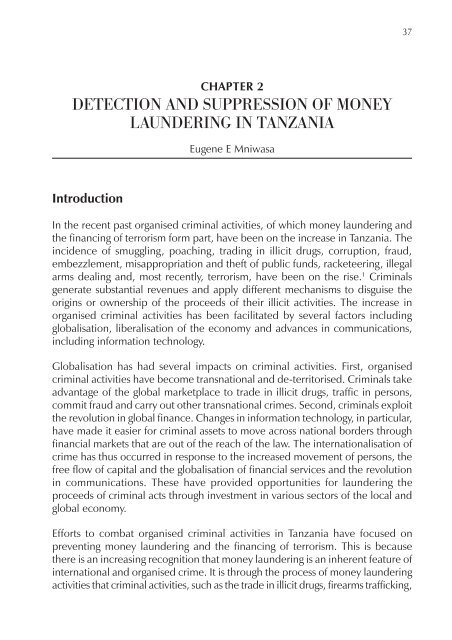Monograph 108 complete download - Institute for Security Studies
Monograph 108 complete download - Institute for Security Studies
Monograph 108 complete download - Institute for Security Studies
You also want an ePaper? Increase the reach of your titles
YUMPU automatically turns print PDFs into web optimized ePapers that Google loves.
37<br />
CHAPTER 2<br />
DETECTION AND SUPPRESSION OF MONEY<br />
LAUNDERING IN TANZANIA<br />
Eugene E Mniwasa<br />
Introduction<br />
In the recent past organised criminal activities, of which money laundering and<br />
the financing of terrorism <strong>for</strong>m part, have been on the increase in Tanzania. The<br />
incidence of smuggling, poaching, trading in illicit drugs, corruption, fraud,<br />
embezzlement, misappropriation and theft of public funds, racketeering, illegal<br />
arms dealing and, most recently, terrorism, have been on the rise. 1 Criminals<br />
generate substantial revenues and apply different mechanisms to disguise the<br />
origins or ownership of the proceeds of their illicit activities. The increase in<br />
organised criminal activities has been facilitated by several factors including<br />
globalisation, liberalisation of the economy and advances in communications,<br />
including in<strong>for</strong>mation technology.<br />
Globalisation has had several impacts on criminal activities. First, organised<br />
criminal activities have become transnational and de-territorised. Criminals take<br />
advantage of the global marketplace to trade in illicit drugs, traffic in persons,<br />
commit fraud and carry out other transnational crimes. Second, criminals exploit<br />
the revolution in global finance. Changes in in<strong>for</strong>mation technology, in particular,<br />
have made it easier <strong>for</strong> criminal assets to move across national borders through<br />
financial markets that are out of the reach of the law. The internationalisation of<br />
crime has thus occurred in response to the increased movement of persons, the<br />
free flow of capital and the globalisation of financial services and the revolution<br />
in communications. These have provided opportunities <strong>for</strong> laundering the<br />
proceeds of criminal acts through investment in various sectors of the local and<br />
global economy.<br />
Ef<strong>for</strong>ts to combat organised criminal activities in Tanzania have focused on<br />
preventing money laundering and the financing of terrorism. This is because<br />
there is an increasing recognition that money laundering is an inherent feature of<br />
international and organised crime. It is through the process of money laundering<br />
activities that criminal activities, such as the trade in illicit drugs, firearms trafficking,
















